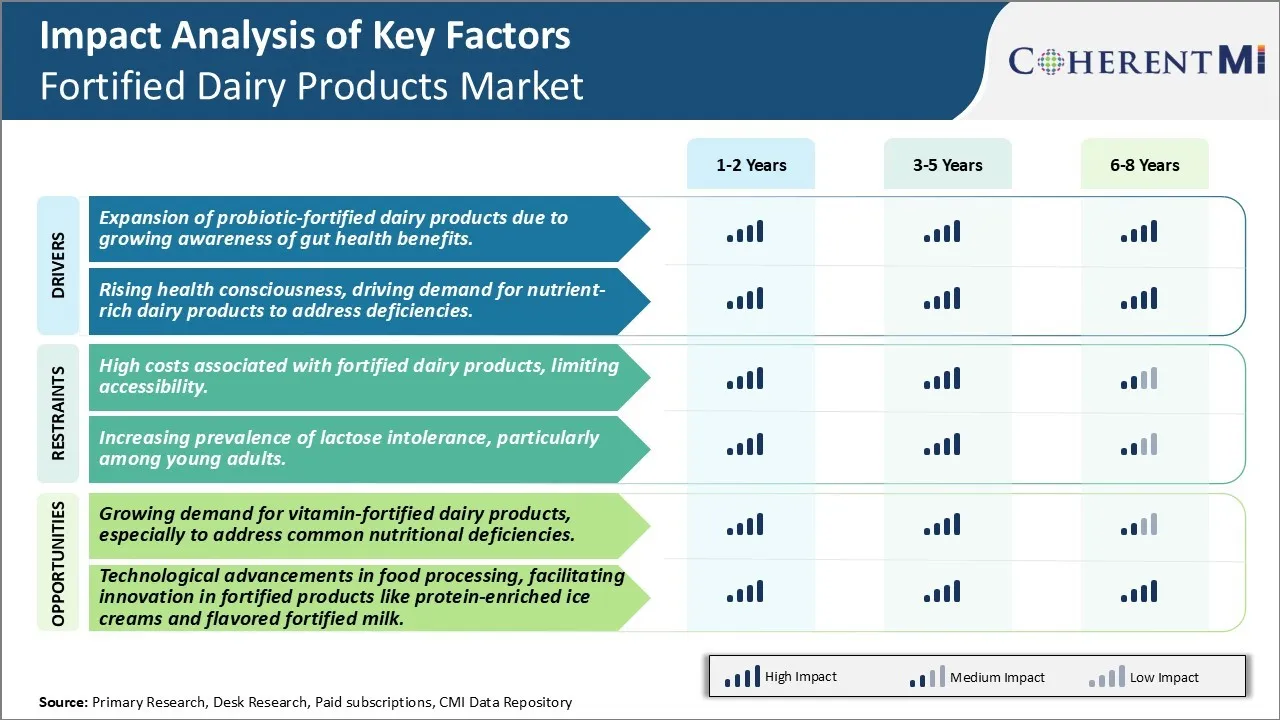Fortified Dairy Products Market Trends
Market Driver - Expansion of Probiotic-Fortified Dairy Products Due to Growing Awareness of Gut Health Benefits
Probiotic fortified dairy products are witnessing increasing demand globally owing to growing awareness regarding the health benefits associated with consuming probiotics. Probiotics are live microorganisms that when consumed in adequate amounts provide numerous health advantages to the host. Regular consumption of probiotic-rich foods helps balance and promote growth of good bacteria in the gut. This, in turn, aids in better digestion, enhances immune response and lowers risk of certain diseases.
Over the past few years, researchers have discovered novel linkages between gut microbiota composition and various health conditions beyond digestive health. Studies now suggest that imbalance in gut microbiome is linked with obesity, depression, cardiovascular issues and certain types of cancer among other ailments. Such revelations have created renewed interest among health-conscious consumers regarding importance of microflora in our gut. They are making lifestyle changes to attain or maintain a state of balanced gut health through diet and supplementation with probiotic products.
Besides offering gut and overall health benefits, probiotic fortification provides opportunities for product differentiation in highly competitive markets. Additionally, it helps tackling competitive pressure from plant-based milk substitutes increasingly preferred by health-conscious customers. Hence more established dairy majors are exploring avenues to fortify their dairy product portfolio with probiotic cultures and drive top-line via new product development in this segment.
Growing consumer awareness of role of probiotics in holistic well-being combined with launch of innovative delivery formats is set to further propel demand and growth trajectory of probiotic-fortified dairy segment globally in the foreseeable future.
Market Driver - Rising Health Consciousness, Driving Demand for Nutrient-Rich Dairy Products to Address Deficiencies
With growing health and nutrition consciousness, consumers are placing increasing importance on balanced diet, supplementation and intake of micronutrient-rich foods. However, busy lifestyles and inconsistent dietary patterns lead to various deficiency states which adversely impact overall health and wellness. Diet experts often warn about lack of key vitamins and minerals in regular urban diets especially in developing countries undergoing nutrition transition. This has serious implications as deficiencies compromise immunity, cognitive function and increase chronic disease risk over the long-term. Recognizing micronutrient deficiency as critical public health issue, various organizations recommend staple foods be fortified with important vitamins and minerals. As one of most consumed dairy foods globally, milk is being advocated as ideal vehicle for large-scale micronutrient fortification programs. It is cheaply and easily available. Moreover, milk can deliver fat and water-soluble vitamins along with minerals to the bodies in readily bioavailable forms. Fortification allows addressing multiple deficiencies through single food vehicle on a daily basis thus helping people meet Recommended Dietary Allowances (RDAs).
Leading diary companies are now fortifying their products such as milk, yogurt and cheese with vitamins A, D and B-complex along with important minerals like calcium, zinc and iodine as per dietary gaps in target populations. While meeting regular nutrient needs of customers, fortified dairy items effectively function as supplements to salvage deficiencies- a factor driving steady demand growth. Further, nutritionally enhanced products help companies aligning with evolving health and wellness missions of consumers.

Market Challenge - High Costs Associated with Fortified Dairy Products, Limiting Accessibility
One of the key challenges faced by players in the fortified dairy products market is the high costs associated with fortifying dairy products. Fortifying dairy products entails adding various nutrients like vitamins, minerals, and proteins to regular dairy products which necessitates specialized equipment and techniques. This fortification process is a complex multi-step procedure that requires specific micronutrient premixes, additional processing facilities, robust quality control protocols, and specialized training for production staff. All these elements contribute to elevated production costs. Further, labeling and packaging of fortified products also require additional expenses. These increased costs of fortified dairy products, as compared to regular dairy items, poses affordability issues for lower-income population in developing countries where micronutrient deficiencies are highly prevalent. The higher prices can limit the accessibility of fortified dairy products for underprivileged consumers who need them the most. With the cost of fortification estimated to increase the final product prices by 10-15%, it becomes challenging for dairy companies to achieve profitable sales volumes given the price sensitivity of cost-conscious customers.
Market Opportunity - Growing Demand for Vitamin-Fortified Dairy Products, Especially to Address Common Nutritional Deficiencies
One of the major opportunities for players in the fortified dairy products market lies in the growing demand for milk and other dairy items fortified with crucial vitamins and minerals. Micronutrient deficiencies or ‘hidden hunger’ is widely prevalent across both developing and developed regions with lack of essential vitamins and minerals severely impacting public health. Fortified dairy products provide a simple solution to bridge the gap as milk and other dairy items are naturally deficient in certain key vitamins like A, D, B12, and minerals like iron, iodine and zinc. The rising health-conscious consumer base is increasingly relying on fortified foods to meet their daily dietary needs. Food companies are therefore able to earn goodwill by offering fortified options that aid in prevention of common deficiencies and support overall wellness. As awareness about benefits of micronutrient-rich diet increases globally, sales potential of fortified dairy products is expected to rise tremendously in the coming years.